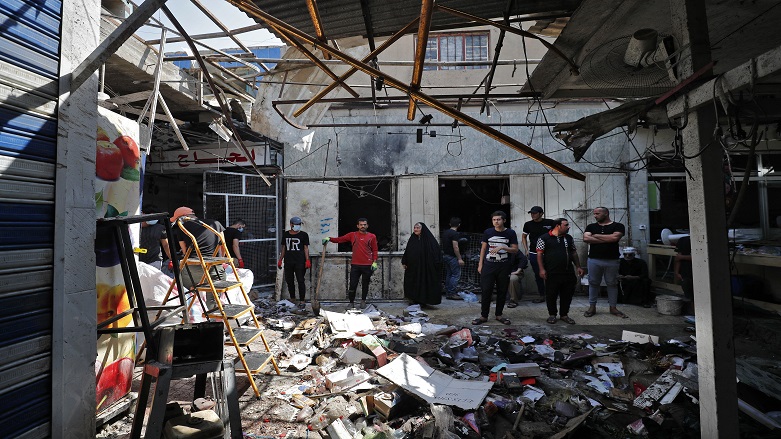US condemns Baghdad attack as it reaffirms commitment to defeat ISIS

WASHINGTON, DC (Kurdistan 24) – US State Department Spokesperson Ned Price denounced the ISIS bombing that killed some 30 people in Baghdad’s Shia neighborhood of Sadr City on Monday.
“We condemn in the strongest possible terms the terrorist attack in Baghdad yesterday,” Price said as he began Tuesday’s press briefing.
Read More: Casualty numbers in Baghdad suicide bombing rise to 30 dead, over 50 wounded
“ISIS has claimed responsibility for the attack in Sadr City which killed at least 30 people and injured dozens of others,” Price continued, adding, “We extend our heartfelt condolences to the families of the victims and hope for a speedy recovery for all of those wounded.”
Price noted that the bombing occurred on the eve of Eid al-Adha, although he refrained from stating an obvious point: How could a group that claims Islamic credentials launch such an assault, as people prepare to mark a major Muslim holiday?
Perhaps, most significantly, Price used the occasion to once again reiterate the Biden administration’s determination to continue the fight against the terrorist group.
“The US reaffirms its commitment to support the Iraqi people and their government in these difficult times,” Price said, “and we remain steadfast in our commitment to the efforts of the Global Coalition to degrade and to defeat ISIS.”
Although the US is leaving Afghanistan after two decades’ spent fighting there, it is not leaving Iraq, as US officials, from President Joe Biden on down, have repeatedly stated.
Read More: Biden reaffirms commitment to fight against terrorism in Middle East as US leaves Afghanistan
Abadi’s Premature Declaration of Victory
Haider al-Abadi, deputy head of the al-Dawa party, became Iraqi Prime Minister in September 2014, after the Obama administration made the resignation of Nouri al-Maliki, who headed al-Dawa, a pre-condition for US support for Iraq against ISIS.
Some three years later, on December 9, 2017, Abadi declared that ISIS had been defeated in Iraq. He even designated December 10 as a national holiday to mark the supposed victory. Presumably, part of Abadi’s calculation was an effort to burnish his credentials ahead of the May 2018 elections—which, in any case, he lost, despite extensive US efforts to secure him a second term.
These events occurred when Rex Tillerson was Secretary of State. Mike Pompeo replaced him in April 2018, but even before Tillerson left, people like Eliot Cohen, Dean of The Johns Hopkins’ University School for Advanced International Studies, criticized him as “the worst Secretary of State in living memory.”
“Tillerson was, as is now recognized even by those who put him there, a disaster,” Cohen wrote in late 2017.
Baghdad’s declaration of victory over ISIS, thus, occurred during a period of abysmal leadership at the State Department. With a more capable Secretary of State, the US might have intervened to stop Abadi from misrepresenting the state of the conflict with ISIS.
Strategic Dialogue Begins This Week
The Biden administration will initiate its first in-person session of the US-Iraq Strategic Dialogue on Friday, when Iraq’s Foreign Minister Fuad Hussein will meet US Secretary of State Antony Blinken.
A summit meeting between Biden and Kadhimi will follow on Monday.
This will be the second in-person session of the US-Iraq Strategic Dialogue, with the first held in 2020, under former President Donald Trump.
The Strategic Dialogue is important diplomacy for the Kurdistan Regional Government (KRG).
Read More: The US-Iraq Strategic Dialogue: Good news for the Kurdistan Region
The same officials who attended the 2020 meetings in Washington will attend this year’s session: Fawzi Hariri, Chief-of-Staff of the Kurdistan Region President; Dr. Amanj Raheem, KRG Cabinet Secretary; Lawk Ahmed, Chief-of-Staff of Vice President Mustafa Sayid Qadir; Gen. Hajar Ismael, Director of Coordination and Relations at the Ministry of Peshmerga Affairs; and Bayan Sami Abdul Rahman, the KRG Representative in Washington.
